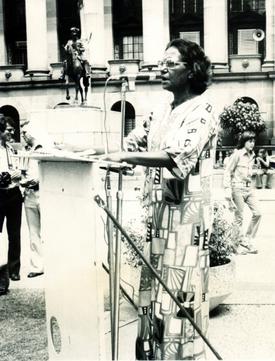
Oodgeroo Noonuccal ( UUD-gə-roo NOO-nə-kəl; born Kathleen Jean Mary Ruska, later Kath Walker was an Aboriginal Australian political activist, artist and educator, who campaigned for Aboriginal rights. Noonuccal was best known for her poetry, and was the first Aboriginal Australian to publish a book of verse.

Rum Jungle or Unrungkoolpum is a locality in the Northern Territory of Australia located about 105 kilometres south of Darwin on the East Branch of the Finniss River and it shares a boundary with Litchfield National Park. It is 10 kilometres west of Batchelor.
The Northern Land Council (NLC) is a land council representing the Aboriginal peoples of the Top End of the Northern Territory of Australia, with its head office in Darwin.

Robert Tudawali, also known as Bobby Wilson and Bob Wilson, was an Australian actor and Indigenous activist. He is known for his leading role in the 1955 Australian film Jedda, which made him the first Indigenous Australian film star, and also his position as Vice-President of the Northern Territory Council for Aboriginal Rights.

Faith Bandler was an Australian civil rights activist of South Sea Islander and Scottish-Indian heritage. A campaigner for the rights of Indigenous Australians and South Sea Islanders, she was best known for her leadership in the campaign for the 1967 referendum on Aboriginal Australians.
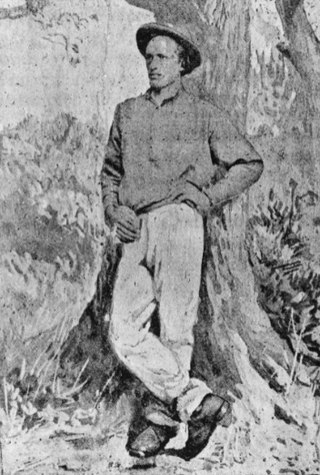
James Alpin Macpherson sometimes spelled "MacPherson" or "McPherson," and otherwise known as The Wild Scotchman, was a Scottish–born Australian bushranger active in Queensland and New South Wales in the 1860s. He was operational throughout the greater Wide Bay area and was eventually apprehended by members of the public outside the town of Gin Gin, Queensland.
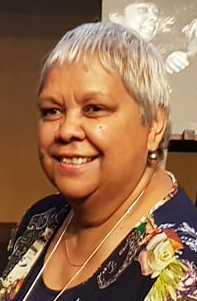
Jacqueline Gail "Jackie" Huggins is an Aboriginal Australian author, historian, academic and advocate for the rights of Indigenous Australians. She is a Bidjara/Pitjara, Birri Gubba and Juru woman from Queensland.
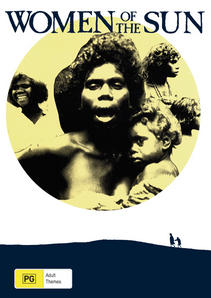
Women of the Sun is an Australian historical drama television miniseries that was broadcast on SBS Television and later the Australian Broadcasting Company in 1981. The series, co-written by Sonia Borg and Hyllus Maris, was composed of four 60-minute episodes to portray the lives of four Aboriginal women in Australian society from the 1820s to the 1980s. It was the first series that dealt with such subject matter, and later received several awards including two Awgies and five Penguin Awards following its release. It also won the United Nations Association of Australia Media Peace Award and the Banff Grand Prix in 1983.

Mary Beatrice Watson, was an Australian folk heroine in Queensland. She died aged 21 on a small island of the northern Great Barrier Reef with her son and a servant, after escaping an attack on Lizard Island, where she had settled with her fisherman husband not long before. Watson's story was subsequently retold in numerous newspaper and folk accounts, including heroic poems, usually with little attention given to the Aboriginal and Chinese aspect of the events.

The Kungarakany language, also spelt Kungarakan, Gunerakan, Gungaragan, Gungarakanj, and Kangarraga, is undergoing a revival through an AIATSIS language grant and through the efforts of many dedicated people who have contributed their time, expertise and knowledge to revive this once thought extinct language.
McGinness is a surname. Notable people with the surname include:
Cecil Evelyn Aufrere (Mick) Cook was an Australian physician and medical administrator, who specialised in tropical diseases and public health. He was appointed as Chief Medical Officer and Protector of Aborigines for the Northern Territory in 1927. He established much of the infrastructure of the public health system there, including four hospitals, a tuberculosis clinic, a nursing school and the Nurses’ Board of North Australia. He started the Northern Territory Aerial Medical Service together with Dr Clyde Fenton, and he was founding chairman of the Northern Territory Medical Board.
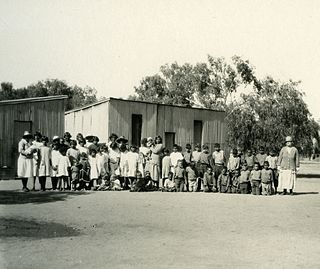
The Bungalow was an institution for Aboriginal children established in 1914 in Alice Springs in the Northern Territory of Australia. It existed at several locations in Alice Springs, Jay Creek and the Alice Springs Telegraph Station.
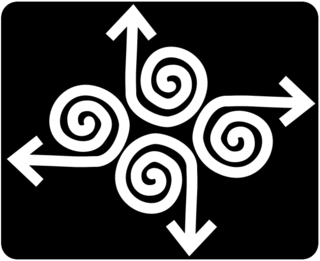
The Federal Council for the Advancement of Aborigines and Torres Strait Islanders (FCAATSI), founded in Adelaide, South Australia, as the Federal Council for Aboriginal Advancement (FCAA) on 16 February 1958, was a civil rights organisation which campaigned for the welfare of Aboriginal Australians and Torres Strait Islanders, and the first national body representing Aboriginal interests. It was influential in lobbying in favour of the 1967 Referendum on Aboriginal Australians. It was renamed to National Aboriginal and Islander Liberation Movement (NAILM) in the early to mid 1970s, before disbanding in 1978.
Kathleen Mary Mills, also known as Mooradoop and Aunty Kathy, was an Australian community leader, singer, Aboriginal elder and activist in the Northern Territory of Australia. She had a large family, all musical, with several of her daughters being well known as the Mills Sisters.
Joseph Daniel McGinness (1914–2003), known as "Uncle Joe'", was an Aboriginal Australian activist and the first Aboriginal president of the Federal Council for the Advancement of Aborigines and Torres Strait Islanders (FCAATSI).
The Kungarakany people, also spelt Koongurrukuñ, Kungarrakany, Kungarakan and other variants, are an Aboriginal Australian people of the Northern Territory. They were called the "Paperbark People" by European settlers.
Alec (Bumbolili) Kruger was a member of the Stolen Generations and he was one of the plaintiffs who unsuccessfully sought compensation from the government in Kruger v Commonwealth in the High Court of Australia.
The Council for Aboriginal Rights (CAR) was founded in Melbourne in 1951 in order to improve rights for Indigenous Australians. Although based in the state of Victoria, it was a national organisation and its influence was felt throughout Australia; it was regarded as one of the most important Indigenous rights organisations of the 1950s. It supported causes in several other states, notably Western Australia and Queensland, and the Northern Territory. Some of its members went on to be important figures in other Indigenous rights organisations.
The Stapleton Siding massacre was a massacre of in Rum Jungle, Northern Territory, Australia.The massacre, which was committed by supplying poisoned food to civilians, killed approximately 80 Kungarakany people. One of the most notable survivors of the massacre was the aboriginal elder Alngindabu. A description of the massacre was passed down by Kungarakany elders, including Alngindabu to her son, aboriginal political activist Joe McGinness.











